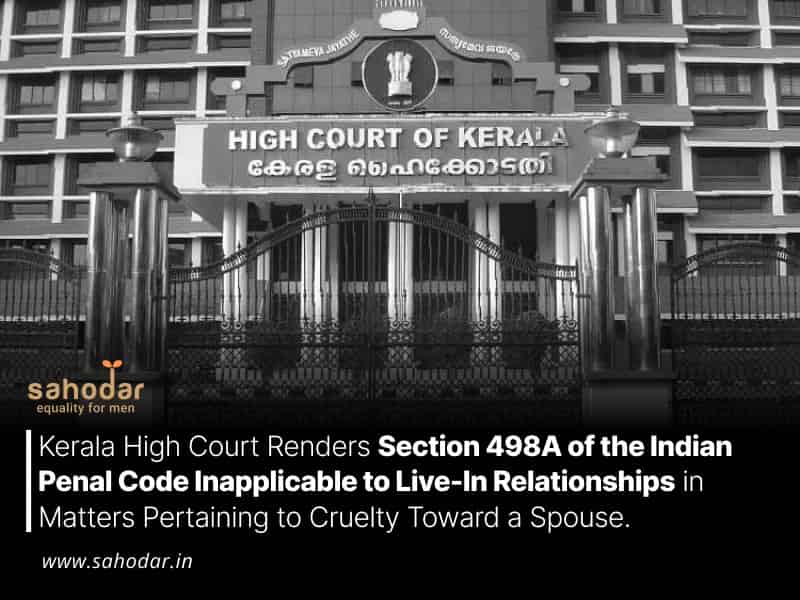When no marriage was solemnised between the woman and the accused man, a woman cannot invoke Section 498A IPC (cruelty to married woman) even if the couple led society to believe they were man and wife, the Court said.
In the legal matter of Narayanan & Ors. v State of Kerala, the Kerala High Court has rendered a significant determination. It has unequivocally clarified that Section 498A of the Indian Penal Code (IPC), which is designed to address instances of cruelty against wedded women, does not extend its jurisdiction to encompass women engaged in live-in relationships. Justice Sophy Thomas, presiding over the case, has reiterated the condition precedent, specifying that for the invocation of Section 498A, the woman in question must maintain a legally recognized matrimonial bond with the accused party, who stands accused of perpetrating acts of cruelty, or with the implicated family members against whom such allegations of cruelty have been leveled.
“When there is some form of marriage either religious or customary which has the colour of a legal marriage, then also, the woman can seek protection under Section 498A of IPC though later, for some reason … that marriage is found to be invalid in the eye of law. But, when there was no solemnisation of marriage at all, and only live in relationship on the basis of a marriage agreement, then the woman cannot seek shelter under Section 498A of IPC, saying that they were holding out to the society as man and wife by their long cohabitation,” the judge explained.
The Court’s determination was rendered in the context of a case wherein a man and his brother had been convicted and sentenced under Sections 498A and 306 of the Indian Penal Code (IPC) with regard to the demise of a woman in 1997. The deceased woman had tragically immolated herself, allegedly due to the purported cruelty and harassment she endured following her elopement with the accused man.
Subsequent to the woman’s suicide, the man and his family members, comprising his mother, father, and brother, had been convicted and sentenced by a sessions court. This verdict had been pronounced shortly after the commencement of their cohabitation.
Challenging the 1998 conviction, the accused parties had partially succeeded in their appeals before an appellate court in 2000. Subsequently, they filed an additional plea before the High Court, seeking an honorable acquittal in the case.
On October 12, the High Court acceded to their revision plea and annulled the earlier trial court’s determinations of culpability. Notably, the High Court emphasized the absence of a formal marital bond between the couple. Their cohabitation had been grounded in an informal “marriage agreement” devoid of legal validity. Accordingly, the High Court opined that the trial court’s finding of guilt under Section 498A of the IPC was erroneous due to the absence of a legally recognized matrimonial relationship between the parties.
“In the case on hand, since the marriage between the 1st revision petitioner and deceased was not solemnized, and they started living together on the basis of a marriage agreement, which has no legal sanctity in the eye of the law, they have to be treated as persons in live-in-relation, and they were not husband and wife, in order to attract an offence punishable under Section 498A of IPC,” said the High Court.
The Court, upon careful consideration of the circumstances, quashed the conviction of the accused for abetment of suicide. This decision stemmed from the absence of any allegations made by the deceased woman against her partner or his brother (the revision petitioners) in her dying declaration.
Consequently, the High Court absolved both the accused individuals of this abetment charge. In parallel, the Court acknowledged that the man’s parents had deceased during the pendency of the case. As a result, the Court declared the charges against the deceased parents to have abated.
The revision petitioners were duly represented by advocate KP Balagopal, while the State government’s interests were upheld by Public Prosecutor Nima Jacob.

